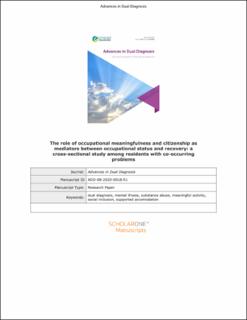| dc.contributor.author | Nesse, Linda | |
| dc.contributor.author | Aamodt, Geir | |
| dc.contributor.author | Gonzalez, Marianne Thorsen | |
| dc.contributor.author | Rowe, Michael | |
| dc.contributor.author | Raanaas, Ruth Kjærsti | |
| dc.date.accessioned | 2022-03-10T12:52:12Z | |
| dc.date.available | 2022-03-10T12:52:12Z | |
| dc.date.created | 2021-05-31T22:55:15Z | |
| dc.date.issued | 2021 | |
| dc.identifier.citation | Advances in Dual Diagnosis: Policy, practice and research in mental health and substance use. 2021, 14 (3), . | |
| dc.identifier.issn | 1757-0972 | |
| dc.identifier.uri | https://hdl.handle.net/11250/2984285 | |
| dc.description.abstract | Purpose Engagement in meaningful occupations and being included as full citizens of the community, is essential in everyday life, and may be of considerable relevance for recovery and quality of life. However, persons with co-occurring substance use and mental health problems experience extensive obstacles to engagement in occupations and citizenship. The relationship between objective measures of occupational status and subjective experiences of occupational meaningfulness, citizenship and recovery, is scarcely researched in the context of co-occurring problems. As such, the purpose of this study is to examine associations between occupational status, occupational meaningfulness, citizenship and recovery and quality of life and to examine the roles of occupational meaningfulness and citizenship as possible mediators between occupational status and recovery and quality of life. Design/methodology/approach The study used a cross-sectional design with a sample of 104 residents at supported housing sites across six Norwegian cities. Findings Linear regression analyzes indicated that occupational status was significantly associated with the citizenship domains caring for others and community participation and with the quality of life measure positive affect. Occupational meaningfulness and citizenship were significantly associated with different domains of recovery and quality of life. Furthermore, mediation analyzes showed that the relationship between occupational status and recovery and quality of life was mediated by caring for others and community participation. Originality/value The results suggest that emphasizing opportunities for occupational meaningfulness and citizenship in practice may have positive implications for recovery among persons with co-occurring problems. | |
| dc.language.iso | eng | |
| dc.relation.uri | https://www.emerald.com/insight/content/doi/10.1108/ADD-08-2020-0018/full/html | |
| dc.title | The role of occupational meaningfulness and citizenship as mediators between occupational status and recovery: a cross-sectional study among residents with co-occurring problems | |
| dc.type | Peer reviewed | |
| dc.type | Journal article | |
| dc.description.version | acceptedVersion | |
| dc.source.pagenumber | 0 | |
| dc.source.volume | 14 | |
| dc.source.journal | Advances in Dual Diagnosis: Policy, practice and research in mental health and substance use | |
| dc.source.issue | 3 | |
| dc.identifier.doi | 10.1108/ADD-08-2020-0018 | |
| dc.identifier.cristin | 1912948 | |
| dc.relation.project | Norges forskningsråd: 269858 | |
| cristin.ispublished | true | |
| cristin.fulltext | postprint | |
| cristin.qualitycode | 1 | |
